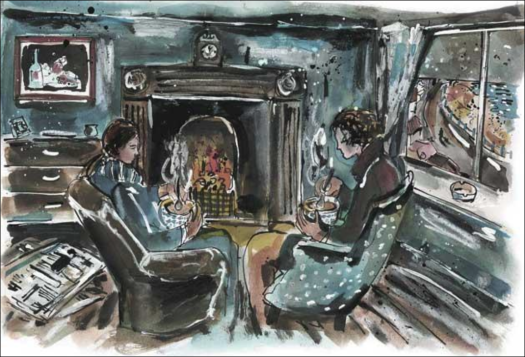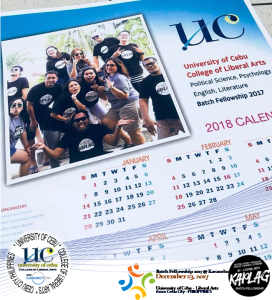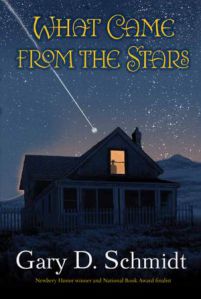Today, please join me in wishing a happy book birthday to the incomparable Robyn Carr.
Robyn is the #1 New York Times bestselling author of the newly released novel, Any Day Now (MIRA Books)—the second in her Sullivan’s Crossing series following What We Find. A recipient of the Romance Writers of America’s prestigious Nora Roberts Lifetime Achievement Award, she has written nearly 50 books with 27 million copies in print worldwide that have been translated into 19 languages across 30 countries. Robyn makes her home in Las Vegas.
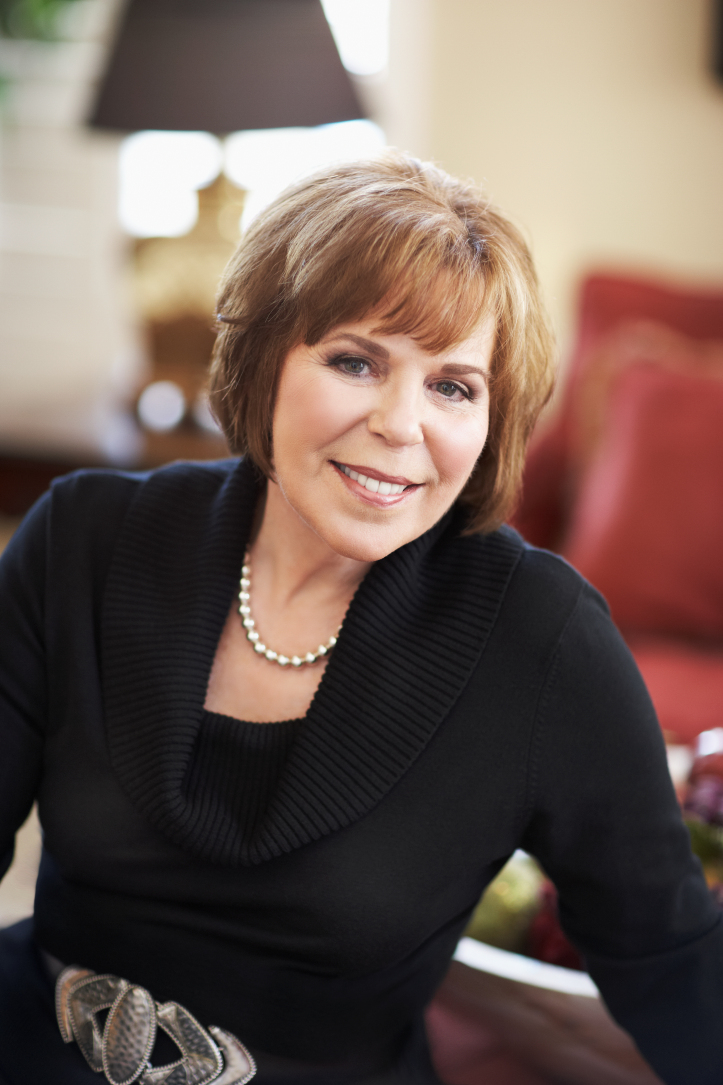 Robyn Carr
Robyn Carr
Praise for Any Day Now:
“Splendid … Carr addresses serious problems realistically and sympathetically while seamlessly weaving them into the fabric of her engrossing story. Characters from the first installment pop in and out like old friends.”—Booklist, starred review
“Abuse, mental illness, addiction, and a host of other issues add a realistic touch to this immersive, upbeat romance. VERDICT Captivating protagonists, colorful supporting characters, and a multithreaded story line make this a welcome addition to what is promising to be a fully involving series, with appeal for both women’s fiction and romance fans.”—Library Journal
From the publisher:
The highly anticipated sequel to #1 New York Times bestselling author Robyn Carr’s What We Find transports readers back to Sullivan’s Crossing. The rustic campground at the crossroads of the Colorado and Continental Divide trails welcomes everyone—whether you’re looking for a relaxing weekend getaway or a whole new lease on life. It’s a wonderful place where good people face their challenges with humor, strength and love.
For Sierra Jones, Sullivan’s Crossing is meant to be a brief stopover. She’s put her troubled past behind her but the path forward isn’t yet clear. A visit with her big brother Cal and his new bride, Maggie, seems to be the best option to help her get back on her feet.
Not wanting to burden or depend on anyone, Sierra is surprised to find the Crossing offers so much more than a place to rest her head. Cal and Maggie welcome her into their busy lives and she quickly finds herself bonding with Sully, the quirky campground owner who is the father figure she’s always wanted. But when her past catches up with her, it’s a special man and an adorable puppy who give her the strength to face the truth and fight for a brighter future. In Sullivan’s Crossing Sierra learns to cherish the family you are given and the family you choose.
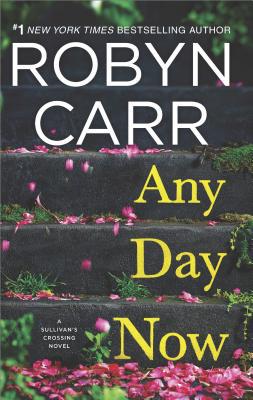
Now, Robyn introduces readers to Sullivan’s Crossing …
John Valeri: What inspired the idea for Any Day Now, and how is this book both a continuation of What We Find (the first book in the Sullivan’s Crossing series) and its own story?
Robyn Carr: There are a number of interesting characters introduced in What We Find, and the lead characters in Any Day Now probably had the slightest appearance in the first novel. But very important to an ongoing series are anchor characters who will appear consistently—not in a gratuitous manner, but filling important roles. Cal and Maggie and Sully are those anchor characters. It’s important to me that they do far more than walk across the stage; they have to fulfill important goals. Therefore the lead character must have a meaningful relationship with all of them. Sierra Jones, Cal’s youngest sister, was someone we knew very little about and what we did know was filled with conflict. She is the baby of the Jones family and was described as “lost.” An addict Cal had tried to save, but failed. She’s a fresh canvas, so to speak. I thought I could develop Cal, Maggie, and Sully as I watched Sierra evolve. And I fell in LOVE with her! She demonstrated such depth. Her strength amazed me; her self-discovery was as thrilling for me as it was for her. She needed the right hero. There were a couple of good men to choose from, and of course I’m always at liberty to create a new one. But Connie Boyle was the perfect yin to her yang. They’re not that much alike, but I could see from the first moment they met, they would fall into step perfectly and become each other’s strength. Here were two characters who were ready for the right partner.
JV: What are the challenges of writing a follow-up book that will satisfy both returning readers and new ones, and how do you know if a particular idea is destined to become a series versus a standalone book?
RC: For me the most important factor is how I feel about the anchor characters and setting—I’m going to be there for a long time. I have to feel a deep emotional connection; I have to want to spend time in that setting with those people—it’s that simple. Or that complicated, depending on your perspective. I loved writing What We Find so much I didn’t want to stop. I wanted to have coffee with Sully; I wanted to have long talks with Cal; I wanted to follow Maggie around and watch how she coped with the complexities of her life. I didn’t want to leave them.
With many characters I feel an urge to help them resolve their issues, but I don’t necessarily want to write their entire lives. I want to cover a part of their lives, get them through a major turning point, then let them live. Get them to the point where they have every opportunity to have rich and fulfilling lives, but I don’t feel I have to be there for it.
With a strong series I have to feel a great desire to stay with the anchor characters for possibly years. They have to personally interest me enough. There is no formula for that—it’s a matter of love. It’s deeply personal, emotional, and unique.
JV: Tell us about Sullivan’s Crossing. What are the unique charms of this small town, and how can a story’s setting become its own character within a book?
RC: Sullivan’s Crossing, being a campground, caters to families, outdoor enthusiasts, vacationers, and recreationalists. People go there to relax, to find renewal, to escape the hectic and ho-hum work world. The atmosphere is one of happiness and camaraderie. Sully’s store provides just about everything vacationers and hikers need, from a cold drink to a charge for laptops and cellphones. The friendliness of the place draws locals from Forest Service employees to neighboring ranchers, so whether you want a freshly baked muffin to go with your coffee or the latest gossip, Sully’s general store is the place. And Sully, at the core of the property, somehow knows how to treat each visitor or neighbor as family. It’s a safe haven, whether your stay is brief or extended. And just by its very nature, it seems to hold that summer magic found in escape.
JV: In your opinion, what are the essential elements of a romance or women’s fiction novel, and how does creating new characters, such as Sierra Jones, allow you to approach genre conventions in fresh and exciting ways?
RC: There are about as many definitions of women’s fiction as there are writers of it, but there’s one definition of romance: romance is about discovering true and everlasting love. My definition of women’s fiction is more about a woman’s discovery of her true self. So—can a novel do both? Absolutely. Women’s fiction concentrates on those issues that can compromise a woman’s happiness and peace of mind because she’s a woman. It can be anything from divorce or widowhood or health issues or economic struggles or, as in Sierra’s case, addiction. Also, romance is a woman’s issue. (It, like many women’s issues, is also a man’s issue, undeniably pursued in an entirely different way.) When you read a novel of mine, you will almost always find both genres. If it’s a romance, it will also deal with women’s issues, and if it’s women’s fiction, there will be at least one love story embedded there. And while there may be a great deal of women’s fiction in which the ending is tragic or at the least disappointing, that’s just not my thing. I prefer to leave the characters in a better place at the end than they were in the beginning. I want my readers to feel uplifted.
JV: You take part in many literary activities beyond writing. What’s the importance of having this type of community, and do you find that it informs your craft?
RC: It’s like any craftsmen’s guild or social group of people with like interests—there’s always something to learn. It’s often been said that hanging out in the bar at the writer’s conference is more informative than attending the workshops. But I’ve also come to really appreciate getting out of that comfort zone and hanging out with people who do different things—it fills the well.
JV: Leave us with a teaser: what comes next?
RC: I’m almost done with a new women’s fiction about a group of cousins who are trying to piece together a traumatic event from their childhood to see if they can untangle the real cause of their family’s estrangement. If the finished book meets with my editor’s approval, that will be next. Then it’s back to Sullivan’s Crossing for a third novel—my mind is playing with that right now, and as usual, I can’t wait to start and see where it takes me. There’s a lot of unfinished business in Sullivan’s Crossing.
***
With thanks to Robyn Carr for her generosity of time and thought and to Claire McLaughlin of Little Bird Publicity for providing this interview opportunity.
Share this:
